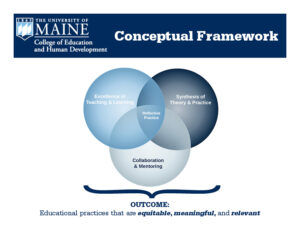Conceptual Framework

The conceptual framework for the University of Maine’s College of Education and Human Development provides the basis for coherence among the programs, curricula, instruction, scholarship, service, candidate performance, assessment and evaluation.
Reflective Practice serves as the centerpiece of the conceptual framework and one of the COEHD’s core principles for teacher preparation at the University of Maine. The reflective teacher is one who seriously acknowledges the complexity of the classroom-learning environment and seeks to understand how certain interrelated variables in their particular classroom setting affect student learning. The reflective teacher does this by analyzing and evaluating the effect that specific curriculum, instruction, and assessment practices will have on their students. Through such analysis the teacher will be able to create a learning environment that is most appropriate for their group of students.
Reflective practice, as one of the core principles, serves as an overarching theme for the COEHD’s teacher education preparation program. The other core principles, Dedication to Teaching and Learning, Synthesis of Theory and Practice, and Collaboration and Mentoring, are developed in the COEHD’s required professional courses through curriculum, political beliefs, personality styles, interests and abilities. Schooling, especially public schooling, continues to have a central role in educating our nation’s citizens for life in this diverse and pluralistic society.
Thus, in order to become reflective practitioners we are guided by three primary principles: 1) Excellence in Teaching and Learning, 2) Synthesis of Theory and Practice, 3) Collaboration and Mentoring.
- It is our belief that reflective practice requires a thoughtful and evaluative analysis of the many forces and factors that affect teaching, learning, and schooling.
- We believe that reflective practice requires recursive self-evaluation and systematic assessment of students and programs.
- It draws upon shared, ambitious standards and expectations for teaching, research, and service.
- It promotes personal and professional understanding of one’s own actions and potential and contributes to continually improving performance.
- The reflective educator is continually developing understandings regarding what content is important to teach, how students learn, and how to teach so that students will learn.
- When faced with educational decisions, the reflective educator knows how to identify and interpret relevant information that can be used to make an informed, rational, and justifiable decision regarding educational practices.
The ultimate outcome of reflective practice is to implement educational practices that are equitable, meaningful, and relevant for student and societal welfare.
The CF aligns with professional and state standards for preparation of educators in Maine. It explicitly affirms and addresses the unit’s professional commitments and dispositions, especially its ongoing commitments to diversity and technology integration, as these critical components are embedded throughout all levels of our program and are continually assessed throughout candidates’ development into reflective practitioners.
